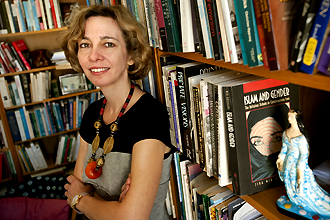Women of Islam in a West African Town
When Adeline Masquelier, a Tulane professor of anthropology, set out to document changes in Muslim culture in Africa, she did not anticipate the bond she'd forge with the women of Niger. Since 1988 she's made several treks to Dogondoutchi, Niger, and has written about those experiences in her book Women and Islamic Revival in a West African Town.

Adeline Masquelier, professor of anthropology, finds inspiration in the dignity of Muslim women in a city in Niger, where she has often traveled and studied. Masquelier is currently doing research in Paris. (Photo by Paula Burch-Celentano)
Masquelier investigates the Islamic revival phenomenon in Africa, which is particularly controversial as it relates to the roles of women.
“I was interested in how women understood themselves as Muslim as well as how the new ways of being Muslim imposed by reformist Muslims had impacted their lives, their visibility and their ability to create value and status for themselves,” says Masquelier.
In a chapter about marriage and women's value, Masquelier explores the debate about mothers who work to provide wealth for their newly married daughters. By amassing gifts for their daughters through a network of friends, mothers help the brides enter marriage with ownership of items such as cooking utensils and furniture to fill their new homes.
Reformist Muslims, many of whom are young men, see the practice of wealth accumulation as sinful and contrary to the teachings of the Qur'an, says Masquelier.
“Reformists want to prevent people from going into debt. But for mothers, what is important is that the wealth belongs to their daughters and is their daughters' to keep,” says Masquelier. “Women depend economically on their husbands, but if their husbands divorce them, women keep all their wedding gifts. It is often the only wealth they have, which they can trade for cash when they find themselves in difficult circumstances.”
Women and Islamic Revival in a West African Town received the African Studies Association's 2010 Melville J. Herskovits Award for best scholarly book on Africa. Of the award, Masquelier says, “I dedicate my award to the women of Dogondoutchi and to one woman in particular who has inspired me with her dignified attempts to make sense of her life in religious terms.”
